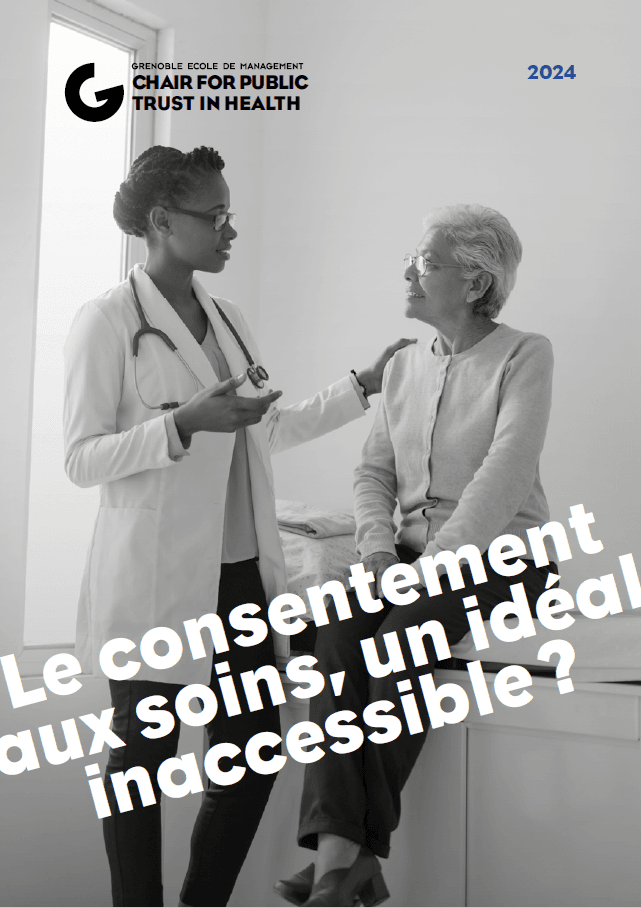Patient Consent – How free are they in their choices with doctors?

The white paper Consentement aux soins, un idéal inaccessible? combines insights from healthcare professionals, legal experts, sociologists, anthropologists, and e-consent tool providers, with one main conclusion: there remains a significant gap between the law and actual practices.
Download the white paper “Consentement aux soins, un idéal inaccessible ?”
 An evolution in medical practices, but resistance remains
An evolution in medical practices, but resistance remains
The medical profession has evolved. Today, in many medical schools, students are taught how to build the trust necessary to obtain genuine consent from patients. However, the system still “resists,” often due to a lack of time, which hampers the patient’s informed consent. Additionally, professionals continue to limit explanations, for example, with patients whom they deem less capable of understanding.
This situation reflects a persistent gap between the ideal and practice of patient consent. As Charles-Clemens Rüling, professor at Grenoble Ecole de Management and coordinator of the white paper, points out, it takes time for practices to evolve, especially in such a complex field as healthcare, where an intervention may involve life-or-death decisions. Consent, therefore, is far more than just a legal formality.
The rise of e-consent: a risky advance?
With the recent advent of e-consent tools, doctors can now track every step of the consent process and enrich it with visual aids such as photos, videos, and interactive diagrams. These tools offer patients a better understanding of their treatments and its risks but also present a new challenge. As C. Rüling explains, there is a risk that these devices will be used primarily to secure the legal aspects of consent, and that this may lead to a trivialization of consent, similar to that seen in digital contexts. The risk is that medical consent becomes empty of meaning, like when we mindlessly click “I agree” to access a website without reading the terms.
While these digital tools are effective in terms of tracking and record-keeping, they should not reduce the doctor-patient interaction to a simple electronic signature. “It would be dangerous to adopt these tools blindly,” warns C. Rüling, emphasizing the need to maintain the human aspect in this critical process.
The paradoxes of medical consent
The document also reveals some striking paradoxes: while a majority of patients feel that free and informed consent plays a key role in their relationship with their doctor, 51% are unaware of their consent rights, and 40% feel that doctors do not respect their obligations. This discrepancy reflects the complexity of the doctor-patient relationship, which relies heavily on trust. There are also patients who, whatever the situation, prefer to know nothing and let the doctor decide for them.
These paradoxes illustrate that consent is not just a matter of strictly following the law, but rather a delicate balance between the right to information and some patients’ desire for protection.
An ethical and societal issue
Medical consent is not simply a legal problem. It reflects the profound transformations in the relationship between doctors and patients. In the past, doctors held almost unquestioned authority, but today, patients are more demanding of their right to information and participation in treatment decisions. This evolution marks an important societal rebalancing, though it remains incomplete.
Since 1997, the burden of proof that information was given falls on the doctor, highlighting the critical importance of consent in healthcare. However, the legal aspect is just one part of the issue. Consent must, above all, reflect an honest and respectful dialogue, where mutual trust between doctor and patient is central.
Nuanced perspectives for the future of medical consent
The white paper Consentement aux soins, un idéal inaccessible? raises essential questions for the future of the doctor-patient relationship. While digital tools offer opportunities to improve understanding and traceability of consent, they must be used cautiously. Moreover, training future doctors in active listening and the establishment of genuine trust is crucial to ensuring truly informed consent.
The white paper sheds light on a complex issue, with its gray areas and bright spots. Despite the progress made, many challenges remain in making medical consent truly free and informed. Initiatives like this white paper contribute to the ongoing debate, encouraging medical professionals to reflect on their practices in order to further enhance this vital aspect of patient care.
Charles-Clemens Rüling, an economist and sociologist, is a professor of organization and management at Grenoble Ecole de Management. He was head of the “Public Trust in Health” research chair at Grenoble Ecole de Management from 2017 to 2024. Since 2024, the work of the “Public Trust in Health” chair has been conducted within the “Digital Health and Society” axis of the “Digital Organizations and Society” chair at Grenoble Ecole de Management.
The “Digital Organizations and Society Chair” aims to produce and disseminate scientific knowledge on the impact of digital technologies on individuals, organizations, and society. The Digital Health and Society axis studies:
– The impact of digital technologies on health
– Improving the well-being of professionals and the quality of patient-caregiver interactions
– Integrating therapeutic tools to transform and personalize healthcare
Go further – our programs
Advanced Master in Biomedical Management
 This Advanced Master is aimed at students with a scientific background who want to take on high-level managerial responsibilities within the pharmaceutical and biomedical industries. This program, designed to develop multidisciplinary skills, will provide a competitive edge in a highly competitive sector. Upon completing this program, which includes innovative case studies and practical teaching, students will have developed the ability to work in an international and multicultural context and to manage teams from diverse fields such as technology, business, marketing, and finance.
This Advanced Master is aimed at students with a scientific background who want to take on high-level managerial responsibilities within the pharmaceutical and biomedical industries. This program, designed to develop multidisciplinary skills, will provide a competitive edge in a highly competitive sector. Upon completing this program, which includes innovative case studies and practical teaching, students will have developed the ability to work in an international and multicultural context and to manage teams from diverse fields such as technology, business, marketing, and finance.

